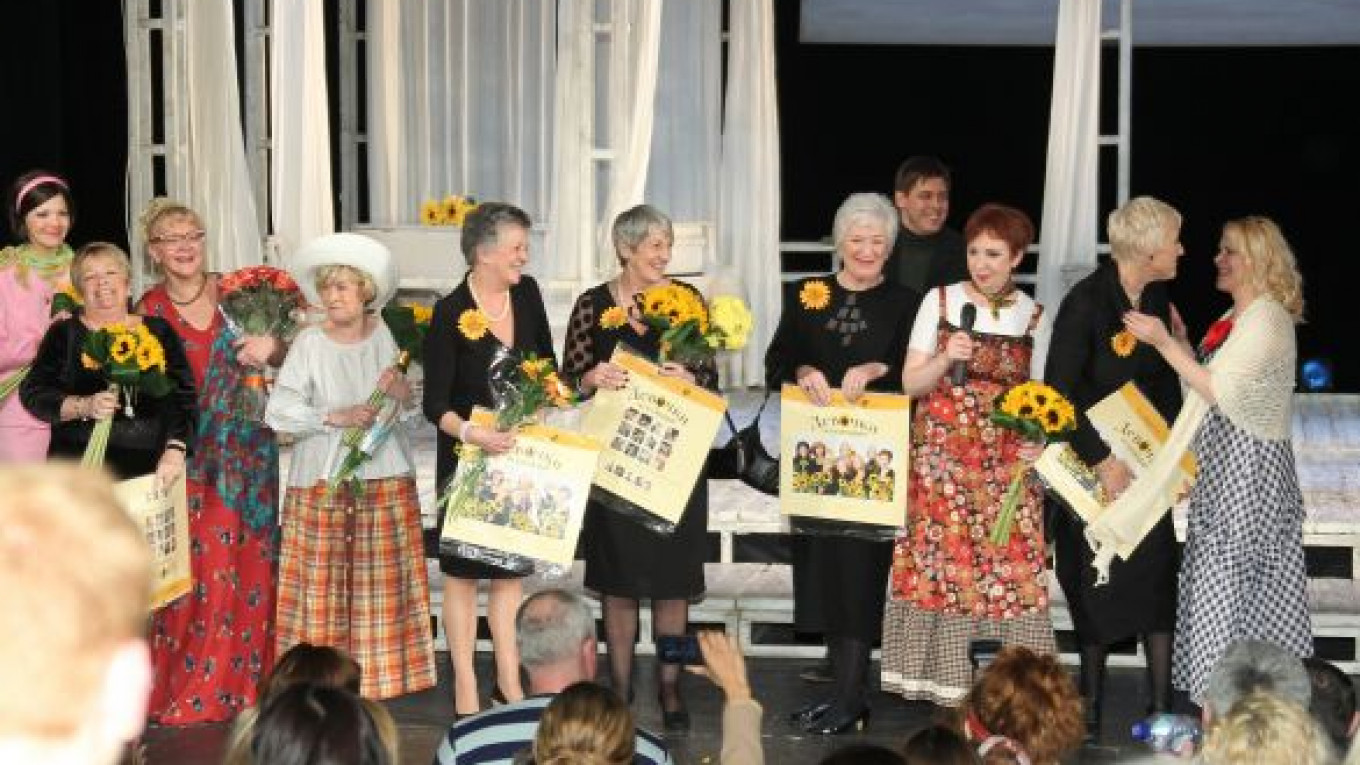The provincial English setting of female community organizations, armed with homely green Marks and Spencer's bags, has been brought to Russia as the original Calendar Girls met their Russian representatives on stage.
The first performances of "Calendar Girls" (Devochki Iz Kalendarya) are taking place this year, providing the Russian audience with a unique take on the Women's Institutes, an otherwise unknown phenomenon on this side of the world.
The play "Calendar Girls" is set around the real-life story of the then-unknown British housewives who photographed themselves in the nude to help raise money for the treatment of a Women's Institute member's husband. Angela Baker's husband, John, had been struggling with leukemia at the time.
Although John eventually died, the play went on to become a hit, eventually spawning a film starring Helen Mirren as the character Chris, who was based on Tricia Stewart, the driving force behind the calendar.
Alexander Ustyugov's new staging of "Calendar Girls" in Moscow prompted the British collective to make a kind of a journey that they had not foreseen when the calendar was first released.
"We never expected that we'd be in Moscow as a result," said Christine Clancy, one of the original girls, commenting on the jealousy of their respective husbands.
They found watching themselves on stage, especially in another language, an incredibly surreal experience.
"Oh it's wonderful — we didn't have to know Russian really because we know exactly what's coming next," Clancy said. She went on to comment that the script is about 60 percent accurate as a whole.
There were some other discernible differences between the original story and the Russian , but the group agreed that the overall result was "really good." They particularly praised the humorous and clever performance of Alexander Sirin who plays John.
The original Calendar Girls based themselves in some ways on the Pirelli calendars, the most recent of which is currently featured in the exhibition "Fashion and Style in Photography" at the Multimedia Art Museum. In the Moscow version of the play, the calendar used is definitely more risque and kinky.
"I wasn't sure about the calendar they used!" Clancy said with a laugh. "It was very different!"
Despite this, the directors managed not to make nudity the overwhelming factor in the play.
"I was surprised at how little time they spent on the nudity. In the original, it occupied much more time," Stewart said.
It's easy to see the truth in Tricia Stewart being the driving force of the group. She seems to remain one to this day. It was Stewart who prompted the standing ovation as the curtains closed on the Russian play.
"We wanted to do it for [John's] memory," she said. "He said that we'd never do it, that it was all talk. It was originally a joke … but we like to think now that John is sitting, looking down on us."
Fittingly, Stewart's Russian double (Galina Petrova) is equally dynamic and energetic, even while discussing topics as banal as broccoli.
The impact of the original production of the calendar still surprises the women, and they never suspected at the time that it would take Moscow by storm the way it has.
"We thought it would just be a local calendar," Stewart said. The collective they came from was based at Rylstone Women's Institute, a small village in north Yorkshire. They had planned 1,000 issues and sold about 88,000 in the first year alone.
Meeting the Russian actresses was an odd experience for the women. They spent some time together prior to the play during which one of the actresses' sons had to act as a translator.
As the play ended, the original girls were welcomed up on stage by the actresses to join hands and dance to the closing music.
And the women have no regrets, despite the initial concerns.
"Even in my 40s I was concerned about what my father would say, but he was really proud," Clancy said.
In the play, her character sips from a hip flask before taking her clothes off. Clancy admits that she might have had a glass of wine too, prior to the event. However, she puts part of the women's success down to luck too.
"In 1999, we were told that if something major had happened in the headlines, the calendar wouldn't have made an impact at all," she said. "Maybe one or two lines would have been devoted to it."
"Calendar Girls" (Devochki Iz Kalendaria) will be performed on April 11 at 7 p.m. at the Theatrium na Serpukhovke, located at 6 Pavlovskaya Ulitsa. Phone +7 499-237-1689. The next performances are on June 5 and June 24. .
A Message from The Moscow Times:
Dear readers,
We are facing unprecedented challenges. Russia's Prosecutor General's Office has designated The Moscow Times as an "undesirable" organization, criminalizing our work and putting our staff at risk of prosecution. This follows our earlier unjust labeling as a "foreign agent."
These actions are direct attempts to silence independent journalism in Russia. The authorities claim our work "discredits the decisions of the Russian leadership." We see things differently: we strive to provide accurate, unbiased reporting on Russia.
We, the journalists of The Moscow Times, refuse to be silenced. But to continue our work, we need your help.
Your support, no matter how small, makes a world of difference. If you can, please support us monthly starting from just $2. It's quick to set up, and every contribution makes a significant impact.
By supporting The Moscow Times, you're defending open, independent journalism in the face of repression. Thank you for standing with us.
Remind me later.






